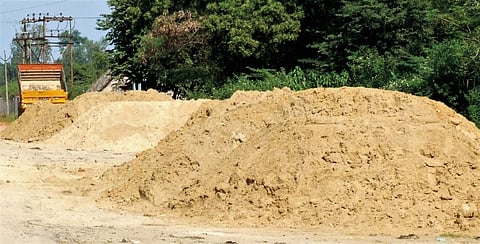

HYDERABAD: The Telangana government leaves no opportunity wasted when it comes to speaking highly of its sand mining policy. However, a recent inspection report by Central and Telangana State pollution control boards on desiltation conducted by the government in sand reaches along the Godavari River, highlights the lack of scientific validity and ecological sustainability in the State’s approach towards sand mining.
The inspection report, a copy of which is available with Express, emphasises the need for the government to review its sand mining policy and align it on par with the Sustainable Sand Mining Guidelines of the Ministry of Environment and Forests. The inspection was conducted along the 39-kilometre stretch of the Godavari, where the State government has been excavating sand as part of the ‘desiltation’ process, over an area of 1,400 hectares in 28 sand reaches under the submergence areas of Annaram and Medigadda barrages. As of June this year, 3.35crore cubic metres of sand have been excavated here.
During inspection, it was found that although the thickness of the Godavari River was between 1.5 to 3 metres, excavation of sand was being conducted till a depth of 3 metres everywhere, with no scientific basis. This is harmful to the river’s ecology.
This is also a violation of State government’s own law, the WALTA Act, which restricts extraction of sand beyond 2 metres’ depth. Moreover, the Centre’s sand mining guidelines restrict extraction of sand to a depth of 3 metres or up until the thickness of the river — whichever is less. The report also pointed out how the sand is being sold for a hefty price of Rs 600 per cubic metre, which is almost eight times the offset price of Rs 83-85, agreed between the State Mineral Development Corporation (TSMDC) and contractors.
Recommendations in the report
The inspection report recommends that the TSMDC prepare a DSR, establish a 'redline' beyond which extraction of sand will be prohibited, devise a scientific a monitoring mechanism on carrying out sand extraction within set boundaries and depth, conduct a scientific replenishment study on the amount of sand which can be extracted without harming the balance of sand deposition in rivers and conduct study to verify the environmental sustainability, carrying capacity and economic viability of the project.